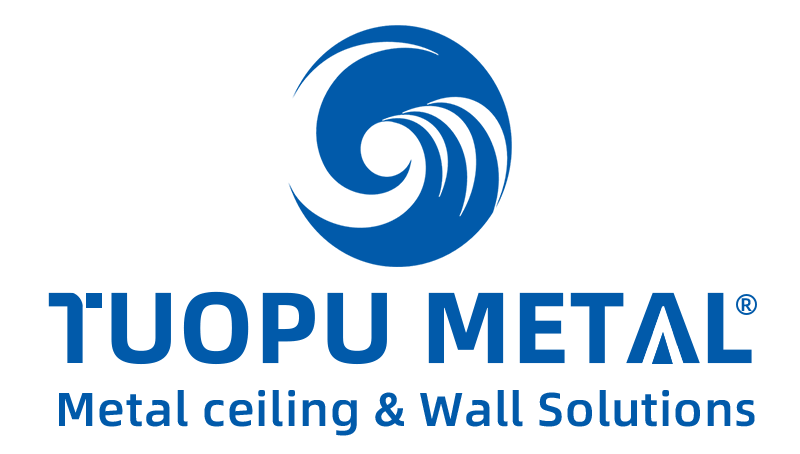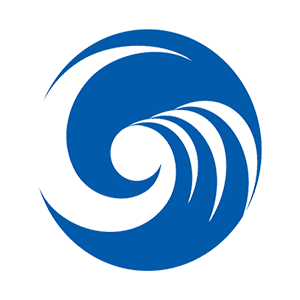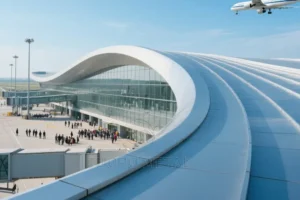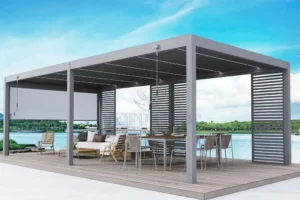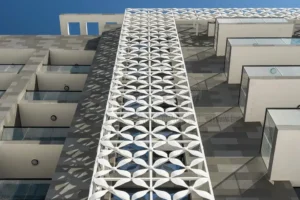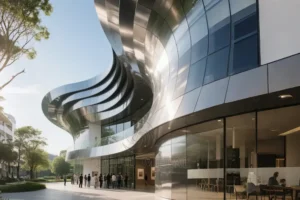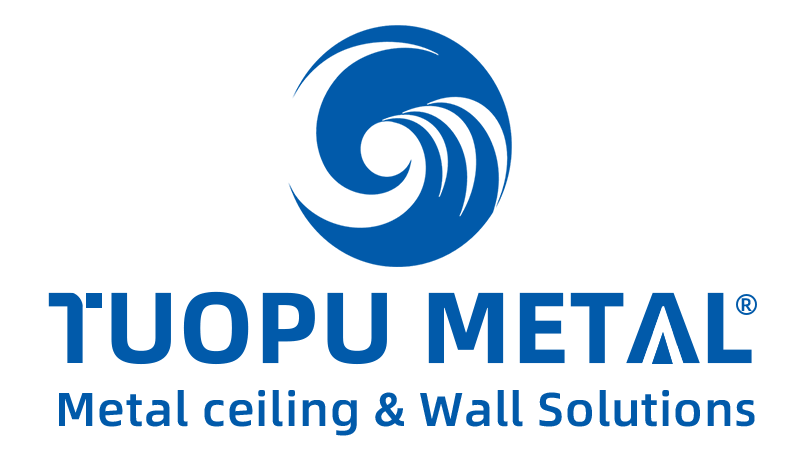For centuries, the mashrabiya has been a hallmark of Middle Eastern buildings. It gives them shade, privacy, and cooling air, all while dressing the facade in lacy elegance. Originally, the screen was carved from wood, but architects now turn to aluminum because of its fresh possibilities. Strong, light, and weatherproof, the metal preserves the mashrabiya look while answering modern engineers demands. The following notes explore its design features, benefits, and everyday roles in new construction.
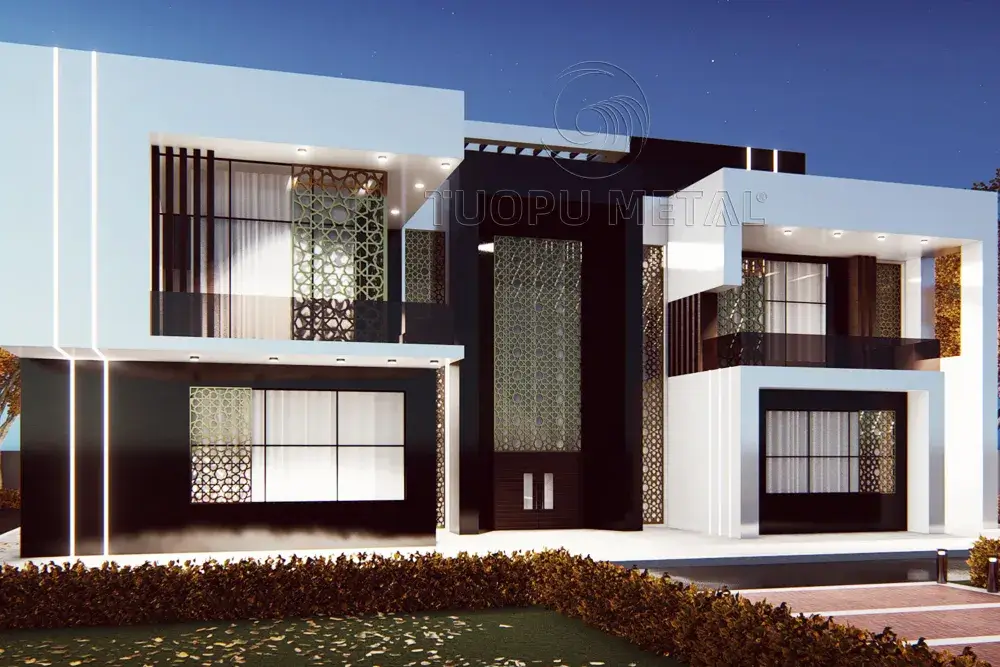
The Legacy of Mashrabiya
Having existed for centuries, the Mashrabiya is a well known element of Middle Eastern architecture. Primarily, they were built using wood which was skillfully worked into elegant intricate shapes that formed a screen for windows or balconies. They helped in protecting structures from harsh sunlight while providing cooling in the interiors and ventilation. They allowed view from the outside while protecting the inside, hence privacy was maintained.
Beyond function, Mashrabiya carried deep cultural and religious meaning. The patterns reflected Islamic art, balancing beauty with purpose. Homes, mosques, and palaces featured these designs to create harmony between light and shadow. Even today, architects use Mashrabiya to maintain this connection to tradition.
With modern materials like aluminum, these screens now offer greater durability and flexibility. They preserve heritage while meeting today’s construction needs. How does aluminum improve this timeless design?
Why Aluminum? Reinventing Mashrabiya for the Modern World
Strength and Resistance to Weather
Wooden traditional Mashrabiya screens can be damaged with time. The screens suffer from deformation and rotting due to heat, sandstorms, and humidity. This issue is solved with the use of aluminum. It does not corrode, remains intact in extremely tough weather conditions, and does not get damaged for many decades.
Lightweight and Strong
Aluminum is both light and sturdy. It reduces the load on buildings, making installation easier. Despite its weight, it remains strong and stable. Large panels can be designed with intricate patterns without compromising durability.
Low Maintenance
Wood requires regular upkeep. It needs sealing, repainting, and protection against pests. Aluminum eliminates these issues. It does not rot, warp, or fade. A simple cleaning keeps it looking new. This makes it a practical choice for architects and builders.
| Feature | Details |
| Alloys | 1050–6063 series |
| Thickness | 1.5–10 mm (Up to 20 mm Custom) |
| Size | 1200×2400–6000 mm; Custom |
| Coatings | PVDF, Powder, Anodized |
| Patterns | Custom CAD, Laser/CNC Cut |
| Applications | Facades, Screens, Interiors |
Crafting Beauty: Design and Customization Options
Elaborate Mashrabiya Laser Patterns
Thanks to todays fabrication tools, even the finest mashrabiya details can be copied with precision. Laser-cutting machinery works hand-in-hand with skilled hands, merging old craft with fresh tech and carving elaborate patterns. Whether a designer wants a faithful historic echo or an entirely original motif, aluminum sheets open nearly endless creative paths.
Colors and Finishes
Aluminum is very versatile and can be covered by varioust finishes to suit different styles. For elegant and classic aesthetics, bronze and gold works well. With matte as well as glossy and metallic covers, the designs will always stand out making these panels suitable for any project. Wood textures also imitate real materials but require no maintenance at all.
Functional Perforation
Design alteration is not limited to appearance only. To achieve better ventilation or shading, the size and quantity of perforations can be modified. This provides greater comfort in outdoor and partially sheltered locations while enhancing beauty and practicality simultaneously.
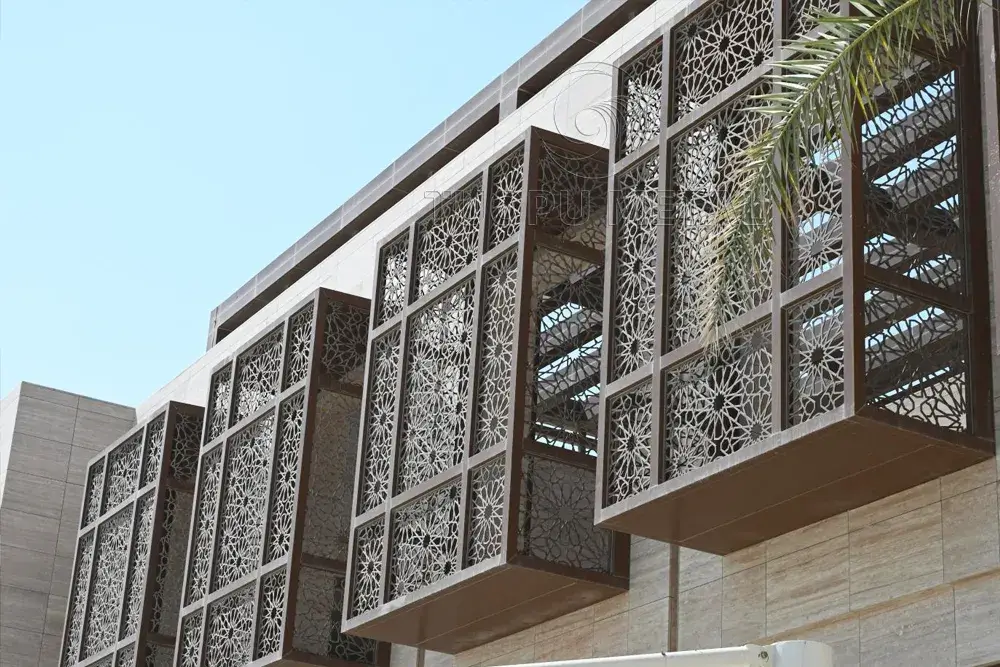
Where Tradition Meets Application: Real-World Uses
Building Facades
Great Mashrabiya aluminum panels are multifunctional artworks that can best serve the exterior walls of buildings. They prevent excess sunlight from pouring into buildings and keep them at cool temperature, thus saving energy. Their use in architecture is needed for designing stunning facades in modern cities.
Interior Partitions and Decorative Screens
In buildings like the offices or hotels, these panels serve a dual purpose of style and privacy. They partition spaces but allowing light and air to pass unobstructed, making the area less claustrophobic. Their intricate patterns add elegance to modern amenities.
Balconies and Railings
These Mashrabiyah panels serve outdoor spaces best by providing ventilation, shade and aesthetics. They transform balconies into part of the building with exquisite style, unlike other partition designs that conceal the view offered which is elegantly appealing yet achieving privacy.
Mosques and Cultural Centers
The beautification of modern islamic architecture is preserved through the use of aluminum panels, which is why their use in the mosques and cultural buildings is popular among devotees. Its use also ensures that heritage is kept while making the building structurally strong and easy to clean.

Installation and Engineering Considerations
Structural Support Needs
Mashrabiya aluminum panels must be securely mounted to ensure stability. Engineers assess load distribution based on panel size and building structure. Proper framing and anchoring systems prevent movement, especially in high-wind areas.
Weatherproofing Techniques
Aluminum itself does not rust, but a little extra finish makes it last even longer. A powder coat or anodized surface stands up to humidity, blowing sand, and fierce heat. Well-sealed joints stop water from sneaking in, so upkeep stays light.
Integration with Smart Building Systems
Today many projects link Mashrabiya panels to smart building hardware. Motors can tilt the panels as the sun moves, keeping rooms cooler without blinds. When joined to HVAC sensors, the panels help balance indoor temp and cut back on artificial chill.
Generic Efficiency and Sustainability
Deficiency of Heat Intake
With aluminum Mashrabiya in place, a building can easily tame how much sunlight slips inside, naturally lowering the indoor heat. The intricate lattice slows wind yet still lets air drift, helping rooms stay cooler without heavy A-C use. That drop in energy demand helps trim utility bills, making the design smart for any hot climate, modern or traditional.
Environmentally Responsible Construction and Materials
Aluminum is considered eco-friendly. Its quality does not degrade when recycled, which diminishes waste and environmental harm. In comparison to wood which needs the trees to be cut down, or plastic which eventually deteriorates, aluminum is more sustainable. The use of aluminum panels results in less use of primary materials, which is beneficial for the renewable construction sector.
LEED Certification and Other Green Building Credentials
Architects often count aluminum Mashrabiya panels when chasing green ratings like LEED. By shading windows and reducing cooling loads, the panels help meet energy targets that many building boards now require. Designers and developers therefore seek these credentials, not only to follow law, but to win over clients who care about the planet. Updated Mashrabiya forms pair classic looks with modern efficiency, letting projects honour tradition while still pushing performance forward.
Conclusion
Aluminum Mashrabiya panels join old craft with fresh engineering in a single skin. Patterned work recalls heritage yet weighs less, cleans easily, and stays cool longer than wood or stone. That blend wins favour with contractors across the Middle East, who need strength but also flexibility on site. Whether sheathing a soaring tower or framing a museum courtyard, the system adapts to styles big and small. In short, it gives builders a smart way to fuse innovation with cultural pride.
About Tuopu Metal
Located in China, Tuopu Metal offers a broad scope of custom designed aluminum panels, for architectural projects, decorative screens, and modern and traditional facades. Considering their advanced manufacturing capabilities, Tuopu Metal provides elegant and functional architectural solutions. Their products make it easy to enhance the beauty of both modern and traditional spaces.
Contact Tuopu Metal for exceptional Mashrabiya aluminum panel solutions tailored to your project. Their unmatched expertise will enable them to deliver high-quality designs that make a statement and are innovative on all levels.
